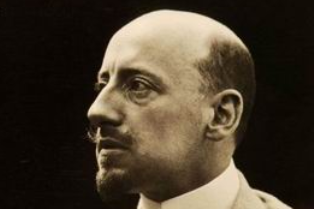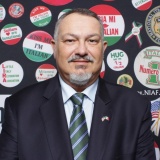
WTI Magazine #47 2014 November, 12
Author : Giuseppina Salzano e Giovanni Verde Translation by:
His nickname, " Il Vate" (the prophet, or better, the poet) effectively sums up Gabriele D'Annunzio's strenght, the power of his lyrical and the incisive traits of his character. His poetry is among the best examples in the history of Italian and European literature; his deeds are part of the popular imagination, a symbol of one of the most complex decades in the history of our country.
Gabriele D'Annunzio was born in Pescara on March 12, 1863 by a wealthy bourgeois family. The years between 1881 and 1891 are crucial for his formation. Attending the worldly and cultural sophisticated environment of Rome, the poet began to shape his literary style, his view of the world, the core of his poetry.
The great literary success comes with the publication of his first novel, "Il piacere" (The Pleasure), published in Milan in 1889. The work, focused on the figure of the decadent esthete, launched a new introspective prose, no longer tied to the canons of positivism, until then central to the literary debate. Around the public figure of Gabriele D'Annunzio, a real star system is created, linked not so much to his verses, but to the flashy style that the writer loved to highlight, and to his life as a mistery and a dream.
In 1892 he begins a correspondence with the famous actress Eleonora Duse. The two meet in 1894, and fall in love: D'Annunzio then moves to Tuscany. In these years, the writer creates the largest part of his works. He starts composing his poetic masterpiece "Alcyone", a work published in 1903.
In 1919 D'Annunzio organizes a sensational paramilitary event, leading a soldier expedition, started from Ronchi di Monfalcone to occupy the city of Fiume (Rijeka), which was not being assigned to Italy from the victorious allied powers after the First World War. With this gesture, D'Annunzio reaches the apex in the process of building his own personal myth and politics.
In February 1921 he retires to a solitary life in a villa in Gardone Riviera, on Lake Garda. Renamed "Il Vittoriale degli Italiani", the villa was enlarged and then open to the public. Here he would work and live up to death, taking care with theatrical taste of a mausoleum of memories and mythological symbols to which his own person was the central attraction.
His relationship with fascism was complex but consistent: the rising fascists celebrate D'Annunzio - reusing his slogans and symbols already used in Fiume - as one of the
highest and most prolific Italian writers; but the poet, apart from the initial adhesion to the "Fasci da combattimento" (the first political movement founded by Mussolini, that will later become the fascist Party), will never be a part of the National Fascist Party, likely to maintain its full autonomy.
Gabriele D'Annunzio dies on March 1, 1938 for a brain hemorrhage. He leaves a poetic heritage made up of sounds and passions, with a force that emerges from the verses and the lifestyle choices of a man able to leave indelible symbols in the history of Italy.



